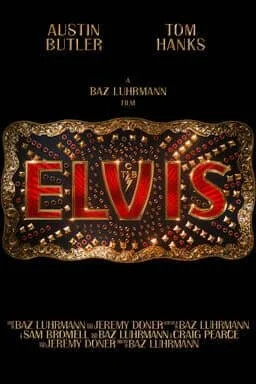"Elvis" - Film Review
Elvis is a spectacle. It’s the first time Baz Luhrmann’s subject matter has completely lined up with his style of whirlwind excess. There are moments in Luhrmann’s The Great Gatsby or Romeo + Juliet where style and subject fleetingly click into place, but the magic show that is Elvis nearly spans the entire film. Luhrmann owes this in part to what will likely be the career-defining performance of Austin Butler as The King himself. Elvis is the rare piece of moviemaking where all the pieces fall into place to create something that is often attempted but impossible to guarantee.
That’s not to say Elvis is perfect. Little time is spent critiquing the social implications of his early career. His musical style and dancing come from Black culture and communities, but despite the film’s sprawling runtime, no meaningful examination of Elvis’ white privilege is evident. It’s disappointing, but not surprising. B.B King is portrayed by Kelvin Harrison Jr., who has an exceptional voice (a truth he’s proven in The High Note and Cyrano). Unfortunately, his character receives only a few minutes on the screen, and he never sings. It’s understandable to an extent, given that this film is about Elvis, but it feels disingenuous to ignore the systemic benefits that skyrocketed him to fame. To the film’s credit, an effort was made to demonstrate that Elvis was a product of the predominantly Black community in Memphis. His love for rhythm and blues and Gospel is genuine and pure. That’s the style of music Elvis is desperate to play. In B.B. King’s only scene with a speaking role, he mentions that Elvis shouldn’t worry about Colonel Parker’s (Tom Hanks) threats of arrest because they’re not going to put a pretty white boy who’s making a lot of people rich in jail. King goes on to say that they’d never put a Black man singing these songs on TV, nor would that man have anywhere near the opportunities Elvis has. The movie makes it clear that the reason Parker is so interested in Elvis is because he’s singing the music of Black communities, but he’s white. That makes him profitable.
warner bros.
These glossed-over moments, and the fact that no Black characters have more than a handful of speaking lines, continue a long tradition of using Black culture and music without giving credit where credit is due. It’s egregious to cast a talented singer like B.B. King and not give him his share of the stage. Using only Black musicians to provide Elvis with inspiration and cover songs, with no depth of character, is repeating the same old cycle.
In no way is this an attempt to disparage the legacy of Elvis or say he didn’t deserve the fame he achieved, but we’ve reached a time in history where more thought must be put into the stories we tell. Care should always be taken when documenting and preserving history, but only recently have there been more diverse and widespread calls for a critical look at who is forming the narrative of our collective human narrative. We must all be more mindful of the power of storytelling.
The first two-thirds of Elvis are a dizzying, dazzling blur of events. It’s a roller coaster montage that manages to have more depth than one would expect from a fast-track plot. The non-stop onslaught of sights and sounds is never too jarring, a perfect use of Luhrmann’s talents. It’s easy to believe Butler is Elvis returned from the dead. Elvis’ star power is a mystery of a bygone era that’s difficult for anyone who has grown up in the digital age to comprehend. It’s impossible to understand the waves of outrage caused by the wiggling of his hips and the way he commanded every form of media. And yet, Butler on the stage at the Hayride radio show in the pink suit is as close as we may come to time travel in this lifetime. That spectacular scene is the first glimpse that The King is back in the building. He’s alive and infecting an entire new generation with magic, yet this scene is only the tip of the iceberg. Butler commands the entire film.
In a stunning departure from form, Luhrmann allows the final third of the film to play out as if it were a fairly standard bio-pic. The razzle dazzle is gone and Elvis becomes a bland movie that’s clearly Oscar bait. The first two-thirds are so distinct that the absence is not only noticeable, but it feels as if the life has been sucked out of the room. Yes, this is during the final years of Elvis’ life so things are on the decline, but that doesn’t mean the movie’s style has to pay the price.
The film ends with actual footage of Elvis performing “Unchained Melody” mere weeks before he passed away. As he sings, historic clips of Elvis through the years are splashed across the screen. It feels a bit like Butler’s thunder had been stolen. After the way he threw himself wholeheartedly into the film, not allowing him see it through to the end is a mistake.
In Bruce Springsteen’s one-man Broadway show, he talks about sitting in his parents’ living room and watching Elvis shake his hips on the television. He describes that moment as a lightning bolt to his young soul that made him beg his mother to rent a guitar so he could learn to be like Elvis. At that age, the guitar was difficult for him, but it didn’t stop Bruce from putting on a show for the neighborhood kids. Colonel Parker describes Elvis as “the greatest show on earth.” If Butler’s performance manages to capture even an ounce of Elvis’ magic, Colonel Parker might just have been right.
Follow me on BlueSky, Instagram, Letterboxd, & YouTube. Check out Movies with My Dad, a new podcast recorded on the car ride home from the movies.

